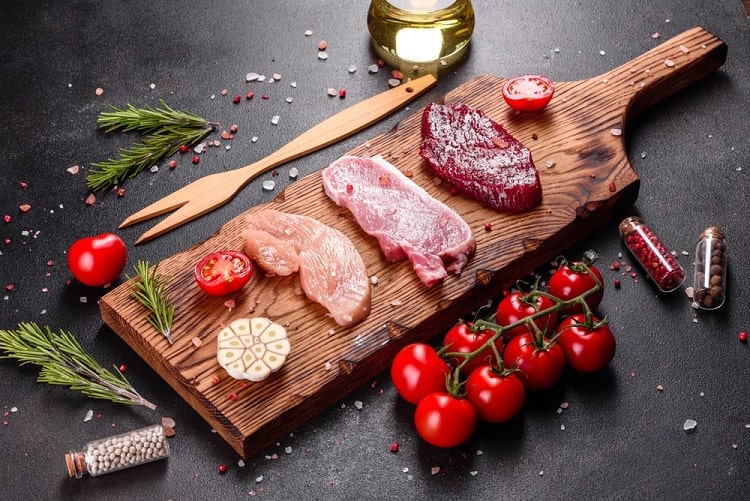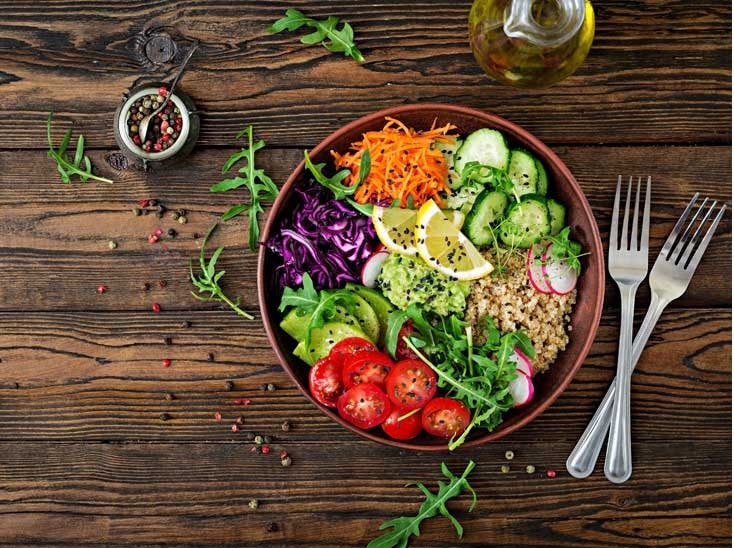The 10 Best Lean Meats and 4 Meats to Avoid for Weight Loss
Dietary alterations are an effective way to promote weight loss. But the point to note here is that everyone has a unique body composition, different goals, a varying activity level, and a diet preference. It is thus essential to determine the diet that suits your needs. If you are someone who wishes to include meat in their diet but worries about gaining weight, then this article can guide you in choosing the optimal meats for weight loss.
For a long time, meat has been considered to hinder weight loss. But recent studies show that meat can be a healthy addition to your diet and can support weight loss. This advancement in research is appealing to a lot of people. As a result, a number of diets started gaining popularity because of their inclusion of meat.
Meat is packed with some essential nutrients that can aid in losing weight when taken in moderation. While meat has been shown to support weight loss, you should consider some factors before consuming meat. This article discusses how to choose the best meat for weight loss and which meats to avoid if you want to lose weight.
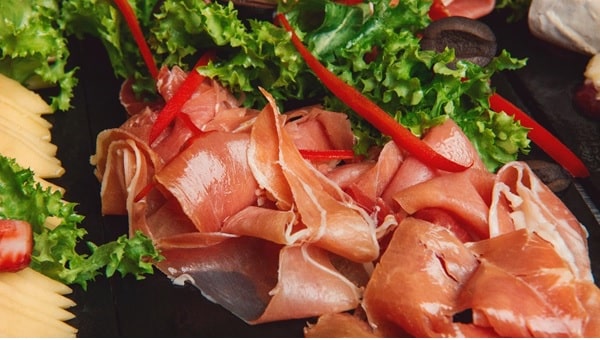
Is Meat Good for Weight Loss?
Unlike the popular opinion that meats cause weight gain, meats can actually support weight loss because of their nutritional profile. Meats can aid you in burning more calories, which is essential for weight loss. Meat consumption for weight loss varies based on your dietary practices and activity levels.
People with high-intensity physical activity every day may require more meat consumption than people with moderate or light physical activity. This is because the meat is an excellent source of protein, which helps to build and preserve lean muscle mass.
Eating high-protein foods like meats can help with weight loss in the following ways:
- Protein boosts the growth of lean muscle mass, which revs up your resting metabolism. Your body can, thus, burn more calories, even at rest.
- When you consume protein-rich foods, you’ll have an increased feeling of satiety, thereby regulating your calorie consumption and preventing weight gain.
- Animal protein has a complete amino acid composition, which has been shown to enhance muscle synthesis and fat metabolism. Muscle tissue requires more energy to function than fat tissue does. Thus, gaining muscle leads to a fast metabolism, which helps you burn more calories.
- Consuming high-protein foods provides you with increased energy levels. High energy levels are associated with increased fat burning.
A 2014 study demonstrates that a high-protein diet can help build lean muscle mass and reduce body fat. Meats also contain essential nutrients like protein, vitamins, and minerals that can reduce inflammation and improve insulin sensitivity. The ability to regulate blood sugar levels can aid in weight loss. Meats can therefore help people lose weight by promoting the development of lean muscle and controlling blood sugar levels.
Factors that Influence the Effect of Meats on Weight Loss
Even though meat can support weight loss, there are some factors that can influence its effect on weight. The nutritional profile of animals might vary slightly depending on the sort of feed they were fed and where they were grown. You can purchase the variety that has the best nutritional profile. Meat’s effects on weight loss are influenced mainly by the following factors:
- Method of cooking meat: How you cook meat has a considerable impact on weight loss. You can grill, bake, roast, steam, broil, pan-fry, or air fry the meat and consume it for weight loss. Avoid deep-fried meat and meat that has been marinated in sauces or dressings with a lot of sugar or salt.
- Include healthy options: You should include healthy additions in your diet along with meat consumption. Otherwise, meat’s ability to promote weight loss may be reduced.
- The cut of meat you select to eat: The cut of meat you eat also affects how much you weigh. For instance, sirloin steak, which has the least amount of saturated fats, is the leanest cut of beef.
- The portion of the meat you consume: Even though meats can aid in weight loss, you need to keep your portions in check. A daily serving of 5.5 ounces of cooked meat is recommended. This suggested intake may vary a little depending on your level of activity
Best Lean Meats for Weight Loss
When you choose meats for weight loss, make sure to choose lean meats for better outcomes. Lean meats are meats that have a relatively low amount of fats.
Grass-fed Beef
Lean kinds of beef, like grass-fed beef, are low in saturated fat and contain fewer calories than conventionally raised beef. Grass-fed beef is also packed with omega-3 fatty acids, which are found to reduce abdominal fat mass in obese people.
You can consume leaner cuts of beef like sirloin steak, tenderloin steak, lean ground beef, and flank steak. But you should consume grass-fed beef in moderate quantities for weight loss. It is best to consume three portions of beef a week for weight loss.
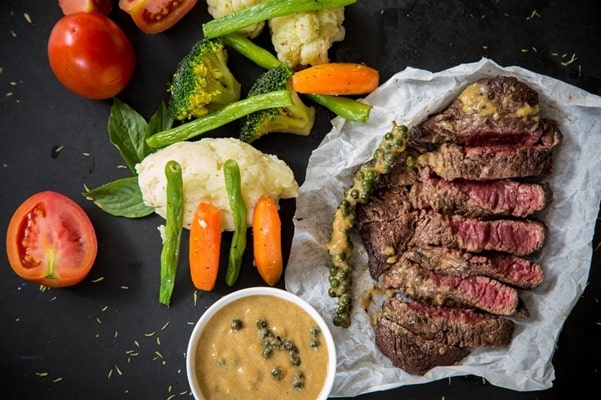
Mollusks
Mollusks are packed with nutrients like protein, vitamin B12, choline, iron, zinc, selenium, and omega-3 fatty acids. Scallops, mussels, and clams are good sources of protein, a macronutrient that promotes muscle growth and supports weight loss.
Since mollusks are loaded with protein, they can lower levels of the hunger hormone ghrelin and increase feelings of fullness, thereby promoting weight loss.
Mollusks are low in mercury, which makes them suitable for your health. The antioxidants in mollusks combat oxidative stress and reduce the risk of many health conditions.
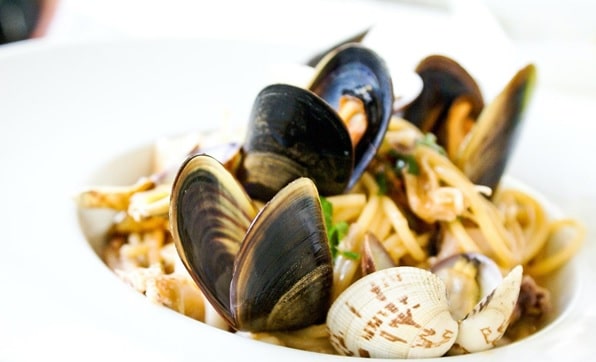
Pork Tenderloin
Pork tenderloin is a leaner cut of pork that contains monounsaturated and polyunsaturated fats. The intake of these beneficial fats can help lower your blood cholesterol level, reducing the risk of various health hazards. Studies show that diets rich in lean pork can lead to a significant reduction in waist circumference, body fat, and belly fat.
Because of its high protein content, pork tenderloin can increase fat burning in the body and boost weight loss. You can also choose other lean pork cuts like pork chops and pork top loin for weight loss. It is best to cook pork at an internal temperature of 145 degrees. Lean pork is thus good for weight loss.
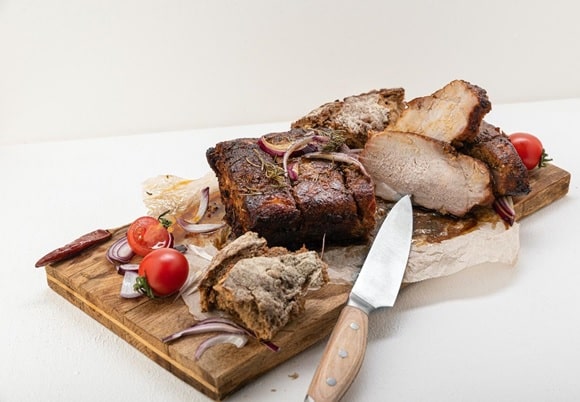
Skinless Chicken
Chicken has less fat compared to other meats. Skinless chicken breast is the leanest cut with high levels of protein. The other nutrients found in the chicken are phosphorus, selenium, niacin, riboflavin, choline, and vitamin B6. You can also opt for breast tenderloins, which are one of the leaner cuts of chicken. You can easily add skinless chicken breast to your diet.
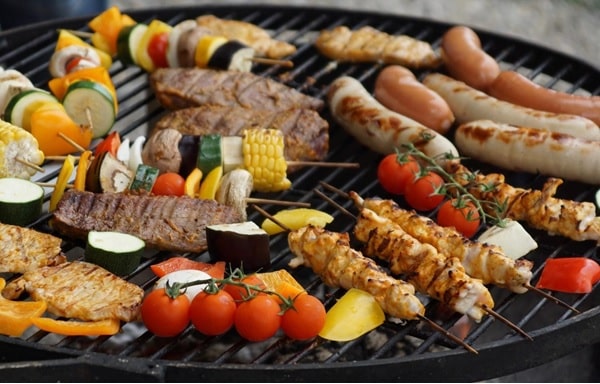
Salmon
Salmon is packed with omega-3 fatty acids, which are healthy fats that decrease inflammation and lower blood pressure. Since it is a good source of protein, it can aid in maintaining muscle mass during weight loss. Potassium found in salmon is a nutrient that prevents excess water retention. Salmon consumption can also reduce the oxidation of LDL cholesterol and support cardiovascular health.
Due to the high levels of protein in salmon, it can regulate appetite-suppressing hormones and prevent excess calorie intake. When you eat salmon in moderation, your metabolism will be stimulated, and belly fat will be reduced.

White Turkey Meat
White turkey meat is low in calories and fat, making it ideal for a low-fat diet. As white turkey meat is a good source of B vitamins, it can boost cognitive performance and relieve symptoms of stress. Roasted turkey breast contains 125 calories and 25 g of protein. You can gain muscle mass and promote weight loss by eating white turkey meat. The wing and breast of a turkey contain this meat.

Venison
A 3-ounce serving of venison has 96 calories, 18 g of protein, and 3g of fat. The vitamins and minerals in venison are vitamin K, vitamin B12, zinc, iron, and choline. Venison has less fat than rabbit or beef. One of the leanest meats, venison, is minimal in calories and helps people lose weight. Venison contains a higher concentration of omega-3 fatty acids, which are beneficial fats that help shed body fat.
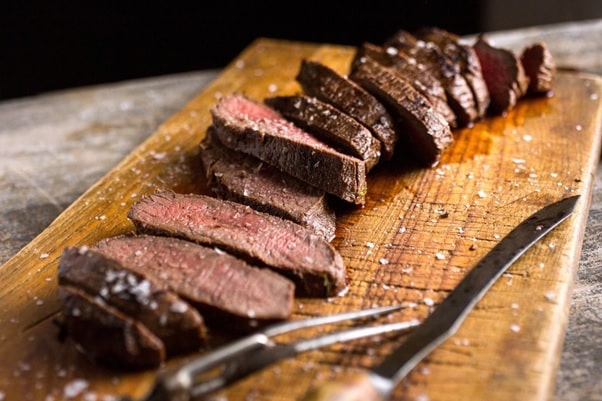
White-fleshed Fish
White-fleshed fish include a variety of fish varieties like Pollock, cod, tilapia, snapper, and much more. It is rich in protein, vitamins, and minerals, which help fuel the body’s metabolism. The white-fleshed fish should be baked, grilled, or pan-fried for the best weight loss results.
You can consume white-fleshed fish twice per week for weight loss. The white-fleshed fish is good for weight loss since it is a high source of lean protein and omega-3 fatty acids.
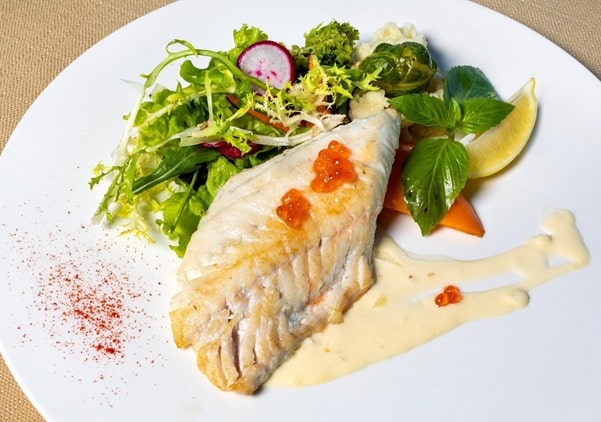
Pheasant
Pheasant meat is low in calories and fat and high in protein. It is a leaner meat compared to wide meat varieties. Since it is high in protein, pheasant can help build muscle and prevent muscle wastage. It is best to consume pheasant in moderation for weight loss.
Ostrich
Ostrich can be a better alternative to beef because of its taste and low-fat content. Vitamin B12 is found in high levels in ostrich, thereby helping with your energy levels and bone health. As ostrich is high in protein and low in fat, it can help you lose weight steadily.
Health Benefits of Lean Meats
When taken in moderate quantities, lean meat can provide you with plenty of health advantages. We shall look into some of the significant health benefits of lean meat.
- Since lean red meats are rich in iron, they can stimulate red cell production and prevent anemia.
- Lean meats contain essential nutrients like zinc and selenium, which together can strengthen your immune system.
- Your cardiovascular health improves if you consume a reasonable amount of lean meats that are high in omega-3 fatty acids and low in saturated fats.
- Selenium in poultry has antioxidant properties that prevent free radical damage and reduce the risk of inflammatory joint disease, diabetes, asthma, eye disease, and cancer.
Lean meats can be healthy additions to your diet when taken in moderation. The nutrients in lean meats can support overall health.
Meats to Avoid for Weight Loss
While meats can support weight loss, you need to avoid certain kinds of meat for better outcomes. These following meats are some of the worst meats for weight loss.
Processed Red Meats
It is best to avoid processed red meats like bacon, hot dogs, sausages, and much more to sustain your weight loss. Processed meats contain high amounts of calories, sodium, and saturated fat, which can stall your weight loss. A slice of 3-ounce bacon has 400 calories and 30 g of fat, making it unsuitable for weight loss.
Fish high in contaminant
When choosing fish for weight loss, you should avoid the ones that are likely to contain high levels of mercury. Consuming fish that are high in mercury can have adverse effects on your digestive and immune systems. Thus, it is best to avoid tilefish, king mackerel, bigeye tuna, and swordfish.
Fatty Red Meats
Fatty red meats have high levels of saturated fat when compared to lean red meats. Eating fatty red meats with a high level of saturated fats and trans fats can result in high levels of cholesterol in the body. When your cholesterol levels are high, you have an increased risk of obesity, cardiovascular disease, and diabetes. It is thus best to avoid fatty red meats to maintain your weight loss.
Fried Meats
Deep frying meat increases its calorie and fat content. This is why we should avoid consuming fried meats for weight loss. Comparing a 3-ounce serving of fried chicken tenders to a similar amount of chicken breast, which contains 135 calories and 3 grams of fat, the fried chicken tenders have 250 calories and 13 grams of fat. The protein content also lowers as you deep fry the meat. The cooking method of the meat can alter its nutritional profile and affect weight. Thus, it is best to avoid fried meats.
Downsides
When consumed in moderation, lean meats can promote weight loss. But consuming excess amounts of lean meats can increase the risk of heart disease and collateral cancer. Because antibiotics can be used in poultry farming, eating such poultry can raise your risk of infection. It is advisable to consume organic meats to reduce these potential effects.
The Bottom Line
Meat can be a healthy addition to your diet and can support weight loss. Lean meat is packed with protein content, which promotes muscle mass and supports weight loss. Saturated fat is also low in lean meats, which makes them suitable for weight loss. You can consume the meat variety that suits your preference and goals.
It is also best to avoid processed meats because of their high calorie and sodium content. While consuming lean meats for weight loss, you can also adopt a healthy lifestyle and exercise regimen, which is beneficial for weight loss.
Faqs
Grass-fed beef is high in protein and low in fat, making it the optimal choice for weight loss. It is packed with conjugated linoleic acid (CLA), a beneficial fat that is shown to reduce belly fat.
The USDA recommends that a 2000-calorie diet include no more than 1.8 ounces of red meat, 1.5 ounces of poultry, and 0.4 ounces of fish per day. Managing your non-meat protein intake is advised for the remaining portions. You can follow this guideline to lose weight.
Lean pork is good for weight loss when consumed in moderation. According to a study, consuming a diet high in fresh, lean pork is linked to decreases in waist size, BMI, and abdominal fat in overweight individuals. There was no loss of muscle mass among overweight individuals.

